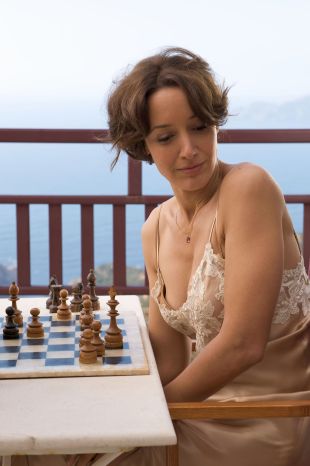When we first meet Hélène (Sandrine Bonnaire), the provincial French housewife and hotel maid at the center of director Caroline Bottaro's drama Queen to Play, she seems almost scrubbed clean to the point of androgyny -- hair pulled back tightly behind her head, dowdy clothes, no makeup -- homeliness on every level. The sense of restraint in her aura is unmistakable, and that extends to her inner emotional life. She's all bottled up, tightly wound, and well out of touch with any inner longings -- so much so that when a dissatisfied co-worker asks her, "Didn't you ever want to leave [and go somewhere else]?" Hélène responds unassumingly, "I don't know, I never thought about it." Yet a life-altering event occurs about 15 minutes into the picture. While Hélène cleans the hotel room of an American couple (Dominic Gould and Jennifer Beals) playing chess on a balcony adjacent to the room, her eyes fall on their erotic physical interplay, and associations from the scene take root in her mind. She realizes that some vital element is missing in her marriage and her life, and begins almost subconsciously attempting to rectify this -- with actions that simultaneously cry out for greater physical and emotional intimacy in her marriage, and demonstrate an overwhelming interest in chess; for Hélène, the two are inseparable. A fascination and then an obsession with the game overtake her. Before long, she's not only sitting up until 4:00 a.m. and playing solo games with an electronic chess set, but taking lessons from an enigmatic recluse named Dr. Kröger (Kevin Kline), whose lavish house she regularly cleans.
The central trope of a sheltered woman growing into herself and discovering her passion in life is an ancient one, so it is quite a testament to Bottaro's remarkable storytelling instinct, and to the preternatural abilities of Bonnaire and Kline as thespians, that they lift this material from the banal into the realm of the sublime. Directorially speaking, Bottaro brings her central character's metamorphosis across with unspeakable grace, and succeeds at creating something emotionally overwhelming. In terms of the actors, Bonnaire seems to innately grasp Hélène's transition. We witness the character's emotions coming unbound and a physical transformation overtaking her through Bonnaire's gradual shift in the way that Hélène carries herself. As for the psychological relationship between Hélène and Kröger, there have been few sequences in movies quite comparable to the pas de deux between these two individuals. Deliberately paralleling the game at the center of the story, each exchange of words or glances between Hélène and Kröger (artfully filmed with a much greater emphasis on facial close-ups than the board itself) is a small masterpiece of conflicting emotions, subtle inferences, and second guesses, with chess itself ultimately used as an metaphor for all emotional interchanges between man and woman. This philosophical element makes the European source of the picture readily apparent.
The film does falter on occasion; in particular, vague hints of excursions into metaphysical territory in the third act feel underdeveloped and ill-advised. Nonetheless, it has much to compensate for that, including not simply the aforementioned performances, but occasional flashes of wit, undercurrents of eroticism, one of the most haunting musical scores in memory (by Nicola Piovani), and -- significantly -- cinematic literacy. Bottaro sets up the final shot to deliberately ape Bonnaire's debut, in Maurice Pialat's 1983 À Nos Amours, and the contrast between the adolescent stasis of that earlier character and the dynamism of the one in this film reinforces one's sense of Hélène's maturation, and her potential for future growth.
